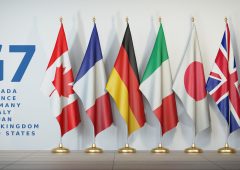Switzerland Reconsiders EU Ties as U.S. Tariffs Shake Global Stability
11.04.2025 12:00 2 min. read Alexander Stefanov
Caught off guard by unexpectedly steep U.S. tariffs, Switzerland now finds itself leaning more heavily toward Europe as global alliances grow less predictable.
President Trump’s decision to impose harsher trade penalties on the neutral nation than on the EU jolted Swiss policymakers and added urgency to long-simmering talks with Brussels.
Though Washington later eased the pressure slightly, the message landed: Switzerland can no longer count on the status quo. President and Finance Minister Karin Keller-Sutter responded by reaffirming Switzerland’s intent to solidify its relationship with the EU—pointing to a political deal reached in December as a potential foundation for deeper integration.
While Switzerland has historically resisted binding EU ties, seeing itself as wealthier, more autonomous, and less bureaucratic than its neighbors, the shifting geopolitical terrain is challenging that mindset. In a symbolic move, Keller-Sutter is set to join EU finance ministers for the first time, as cooperation on economic and security fronts becomes harder to avoid.
Within Switzerland, the debate remains heated. Critics warn that any alignment with the EU threatens the country’s independence, while others, like lawmaker Franziska Roth, argue that stronger partnerships are now essential to safeguard national interests. Even some EU-skeptical voices have criticized the U.S. tariffs, hinting at a softening stance.
With Germany’s economy slowing and the U.S. pivoting toward protectionism, Swiss industry leaders are calling for diversification—looking toward Asia as another growth outlet. Still, many agree that a more anchored relationship with Europe is no longer just strategic, but necessary. As one former ambassador put it, the old world order is cracking, and Switzerland must act before it’s left behind.
-
1
Robert Kiyosaki Predicts 2025 “Super-Crash,” Urges Hoarding Gold, Silver, and Bitcoin
23.06.2025 13:31 2 min. read -
2
Billionaire Slams Meme Stock Hype and Sounds Alarm on U.S. Fiscal Health
15.06.2025 18:00 2 min. read -
3
Billionaire Investor Sees Dollar Crash If Key Support Breaks
18.06.2025 15:00 1 min. read -
4
Nassim Taleb Says Global Trust Is Shifting from the Dollar to Gold
22.06.2025 17:00 1 min. read -
5
Geopolitical Shockwaves Hit Ethereum Hard While Bitcoin Stays Resilient
22.06.2025 16:21 1 min. read
Robert Kiyosaki Predicts When The Price of Silver Will Explode
Robert Kiyosaki, author of Rich Dad Poor Dad, has issued a bold prediction on silver, calling it the “best asymmetric buy” currently available.
U.S. PCE Inflation Rises for First Time Since February, Fed Rate Cut Likely Delayed
Fresh data on Personal Consumption Expenditures (PCE) — the Federal Reserve’s preferred inflation gauge — shows inflation ticked higher in May, potentially delaying the long-awaited Fed rate cut into September or later.
Trump Targets Powell as Fed Holds Rates: Who Could Replace Him?
Federal Reserve Chair Jerome Powell is once again under fire, this time facing renewed criticism from Donald Trump over the Fed’s decision to hold interest rates steady in June.
U.S. National Debt Surge Could Trigger a Major Crisis, Says Ray Dalio
Billionaire investor Ray Dalio has sounded the alarm over America’s soaring national debt, warning of a looming economic crisis if no action is taken.
-
1
Robert Kiyosaki Predicts 2025 “Super-Crash,” Urges Hoarding Gold, Silver, and Bitcoin
23.06.2025 13:31 2 min. read -
2
Billionaire Slams Meme Stock Hype and Sounds Alarm on U.S. Fiscal Health
15.06.2025 18:00 2 min. read -
3
Billionaire Investor Sees Dollar Crash If Key Support Breaks
18.06.2025 15:00 1 min. read -
4
Nassim Taleb Says Global Trust Is Shifting from the Dollar to Gold
22.06.2025 17:00 1 min. read -
5
Geopolitical Shockwaves Hit Ethereum Hard While Bitcoin Stays Resilient
22.06.2025 16:21 1 min. read


